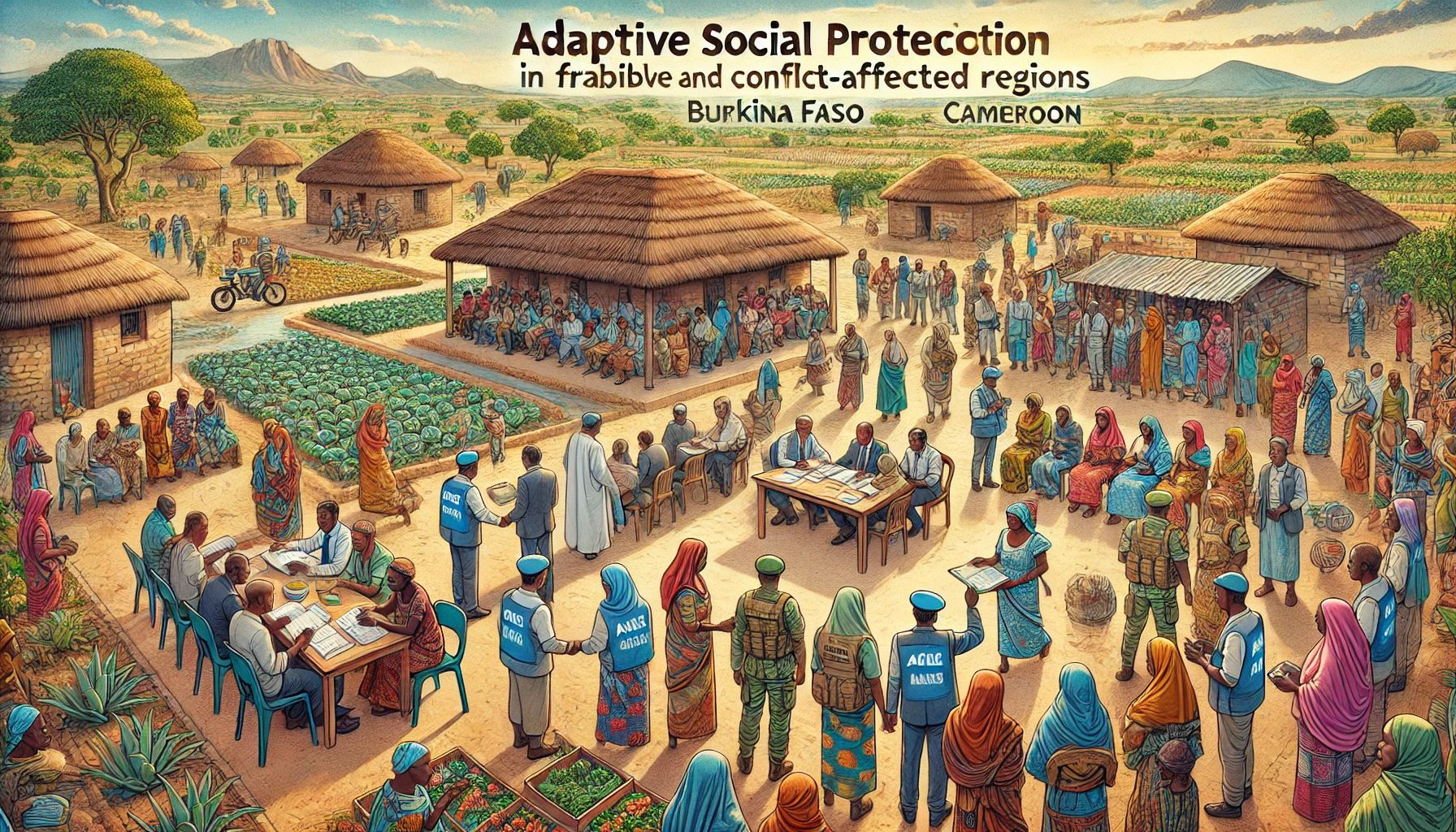Innovative Social Protection Strategies for Fragile and Conflict-Affected Regions
The policy note highlights how adaptive social protection (ASP) programs in fragile, conflict, and violence-affected (FCV) settings like Burkina Faso and Cameroon can mitigate vulnerabilities, foster social cohesion, and strengthen trust in governments. It emphasizes context-sensitive designs, longer-term support, and effective communication to maximize impact.

The policy note "How to Maximize the Impact of Adaptive Social Protection in Contexts of Fragility, Conflict, and Violence: Four Operational Lessons from Burkina Faso and Cameroon" by Mira Saidi represents a collaborative effort by the World Bank’s Social Protection and Jobs Global Practice and regional research institutes. This study draws on nearly 400 interviews conducted across Burkina Faso and Cameroon, exploring the transformative potential of adaptive social protection (ASP) systems in fragile, conflict, and violence-affected (FCV) settings. In these regions, poverty, insecurity, and institutional fragility intersect, creating formidable challenges for development interventions. The research delves into how ASP programs can mitigate vulnerabilities, foster resilience, and strengthen the social contract, particularly in the Sahel, a region profoundly affected by climate change, displacement, and chronic insecurity.
Conflict and Poverty: A Complex Interplay
Fragility and conflict are increasingly shaping the global development landscape, with projections indicating that nearly 60% of the world’s extreme poor will reside in FCV settings by 2030. In the Sahel, these challenges are further compounded by environmental stressors and a growing influx of refugees and internally displaced persons (IDPs), which strain already scarce resources. The cyclical relationship between poverty and conflict is evident, with each exacerbating the other. ASP systems, though proven globally to alleviate poverty, face unique challenges in FCV contexts. This study illuminates the potential of these systems to provide critical support in regions where economic instability and insecurity dominate daily life.
Multifaceted Impacts: Material, Social, and Political Channels
The study identifies three primary ways in which ASP programs influence individuals and communities: material, social, and political channels. Materially, the financial resources provided by ASP programs alleviate immediate hardships, such as food insecurity, and support access to health and education. Beneficiaries in both countries reported using program funds to address urgent needs, safeguarding human capital. However, insecurity often prevented investments in longer-term productive activities. Fear of theft or attacks discouraged beneficiaries from expanding livelihoods, particularly in areas heavily affected by armed conflict. For many, meeting basic needs took precedence over savings or economic ventures.
Socially, ASP programs fostered new connections and strengthened existing relationships, creating informal safety nets within communities. Beneficiaries often reported sharing resources and building solidarity, particularly among displaced populations. These bonds acted as a form of social insurance, enabling mutual support during crises. However, tensions sometimes arose between beneficiaries and non-beneficiaries, particularly when targeting criteria were unclear or poorly communicated. Such dynamics underline the importance of effective communication and community engagement in program design.
Politically, ASP programs hold the potential to enhance trust in government institutions, a critical need in FCV settings. When beneficiaries understood that their support was linked to government initiatives, they reported greater confidence in the state and a more optimistic outlook on their future. Conversely, where communication about government involvement was lacking, many attributed benefits to external donors, missing an opportunity to reinforce state legitimacy. In Burkina Faso, for instance, this gap highlighted the importance of integrating government visibility into ASP programs to strengthen the social contract.
Addressing Operational Challenges
The research revealed several operational challenges and opportunities for improving ASP programs in FCV contexts. Beneficiaries in insecure regions often struggled to access markets or agricultural fields due to safety concerns, limiting their ability to leverage financial assistance for productive purposes. In such environments, longer-term and more substantial support is essential to address ongoing vulnerabilities. Flexibility in program design is also critical. Programs must anticipate security challenges and adapt delivery mechanisms accordingly. Strategies like staggering payment schedules, offering discreet benefit delivery methods, or ensuring modular program designs can help mitigate risks. For example, digital payments in Burkina Faso reduced some risks, though beneficiaries still faced challenges such as theft during fund retrieval.
Social Cohesion as a Cornerstone of Success
Enhancing social cohesion through ASP programs is essential in fragile and conflict-affected settings. The study found that programs emphasizing interaction and collaboration among beneficiaries contributed to stronger community bonds. For displaced populations, shared experiences of hardship fostered a unique solidarity. However, programs also risk increasing grievances among non-beneficiaries, especially in contexts of extreme poverty. Effective communication about program objectives and targeting criteria is crucial to reducing misunderstandings and resentment. Grievance redress mechanisms and consistent dialogue between implementing agencies and communities can further build trust and acceptance.
A Path Forward for Adaptive Social Protection
The study concludes that ASP programs can play a transformative role in addressing the unique challenges of FCV settings, but they require context-sensitive designs. Safeguarding human capital, promoting social stability, and tailoring interventions to local realities are essential for maximizing impact. Longer-term support, innovative communication strategies, and modular program designs are necessary to adapt ASP systems to the challenges posed by fragility and conflict. By prioritizing social cohesion and strengthening the social contract, ASP programs can reduce vulnerabilities, foster resilience, and provide a lifeline to communities navigating some of the world’s most challenging environments. In fragile settings like Burkina Faso and Cameroon, these interventions represent not just an economic safety net but a crucial mechanism for rebuilding trust and hope.
- READ MORE ON:
- adaptive social protection
- Burkina Faso
- Cameroon
- FCV
- FIRST PUBLISHED IN:
- Devdiscourse










